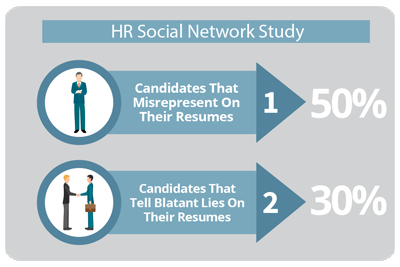All recruiters and HR managers strive to recruit the best candidates. A great hire can improve productivity, boost office morale, and positively impact the company’s bottom line. There are so many upsides of hiring a good candidate.
But… what about the flip side? What are the risks of making a bad hire? This is a question recruiters sometimes might not bother to ask. As a result, they may approach the hiring process with complacency and end up making the wrong hire.
What is a Bad Hire?
A bad hire could be a nightmare.

How does this come about? Well, in diplomatic terms, misrepresentation. In more blunt terms, lying. Candidates can lie in their resumes and applications. This can range from exaggerating educational or work experience to blatantly lying.
A Human Resources Social Network study found that 50% of candidates misrepresent, and 30% tell blatant lies in their resumes.
Misrepresentation is a way how recruiters end up making bad hires. It is not that you go and deliberately hire the worst candidate.
Costs of a Bad Hire
What is so bad about hiring the wrong candidate? After all, as soon as you realize you’ve made a bad hire, you simply fire them and hire someone else. So, what’s the big deal? Actually a lot.
Here’s a snapshot of the downsides of making a bad hire:
Increased Turnover
Every organization needs great employees. But there’s one thing which good employees can’t stand – that is having bad employees as their colleagues or managers. So how do great employees react to bad hires? Well, they simply quit.
Studies have shown that over 80% of employee decisions to quit have been directly caused by other employees.
Dampened Morale
Employee morale is positively correlated with increased productivity, organization loyalty, and higher profitability. And what is the one thing which kills workplace morale? The answer is simple: adding the wrong individuals to the workplace.
In a Robert Half survey cited by the Entrepreneur Magazine, company executives reported that bad hires negatively impacted workplace morale up to 95 percent of the time.
Decreased Teamwork
Teamwork is critical towards organizational success. Its because most tasks involve employees cooperating with their fellow co-workers. For instance, a
Career Builder study quoted 60% of employers reporting that bad hires could not work well with their fellow employees.
The reason is that bad hires often do not fit within the organizational culture or environment. Other employees find it difficult to cooperate with them. The negative impact on teamwork is even worse when the person in question is a team leader or manager.
Decreased Productivity
Workplace morale and teamwork are factors which are critical for boosting productivity. By negatively impacting it, it’s fairly obvious that bad hires negatively impact productivity. This is what some studies revealed.
39% of surveyed businesses have reported significant decreases in productivity which can be directly linked to making bad hires.
Reputational Damage
A poor hiring choice can harm an organization’s reputation. This happens in two main ways. First, low employee morale and higher turnover can tarnish the organization’s image. Once a company is known for hiring the wrong people, it will struggle to attract top talent.
Secondly, a bad hire who interfaces with customers can damage an organization’s image to its customers. A person can exhibit bad behavior like being hostile, rude or disrespectful towards customers. This reputational damage can reduce the chances of repeat business and recommendations from customers thereby impacting revenue.
Financial Costs
There may be significant financial costs of a bad hire. It may be difficult to place a dollar value on workplace morale or reputation. So, here are some hard cash figures for you.
A CareerBuilder survey found a price tag of $25,000 or higher that is attributed to making a single bad hire by 41% of companies. In the same study, 25% of businesses placed a bad hire at the cost of $50,000 or higher.
The financial costs can vary depending on the position for which the hire was made. The CareerBuilder study cited estimates above $7000 to $10,000 as the average cost of hiring the wrong individual for an entry or mid-level position. The cost of wrongfully hiring a manager is typically in excess of $40,000.
That is so significant.
The above figures typically focus on replacing the wrong hire. The financial cost of replacing even the top-talent as a result of the wrongful hire can easily spike. The bottom line is that making a wrong hire can cost an organization a ton of cash. That is why it is so important.
How to Avoid Bad Hires
The ultimate question is: can you avoid bad hires? Absolutely! And it comes down to two words: due diligence. One needs to thoroughly investigate every claim made in an applicant’s resume and cover letter. This includes conducting a detailed and comprehensive pre-employment screening.
The best strategy is contacting a reputable employment screening company to conduct an exhaustive background check on a candidate. Experienced companies are savvy enough to understand the tricks which candidates typically use to fleece unsuspecting recruiters. They can, therefore, expose the misrepresentations, exaggerations and lies a bad applicant would have used to fool you into hiring them. Essentially, a great employee screening company can save you from the nightmare of bad hires.